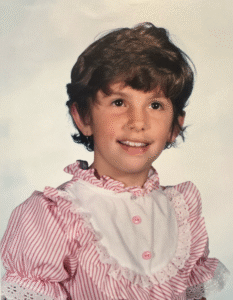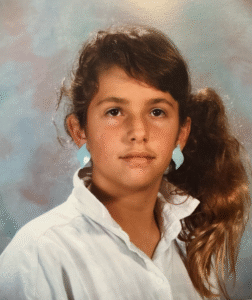*Trigger warning: There will be words used that I do not condone and are only used to emphasize the attitudes of the people towards the neurodivergent in the 1980s.
Part 1: Truth or Lie

The author, Stacy W. Nelson, in Grade 3, 1982-1983.
In the fall of 1982, I entered the third grade which was taught by two core teachers. The mornings were taught by a sweet, mild-mannered woman who taught us the arts, and the afternoon was taught by a cranky older teacher (who I will refer to as Miss McC), who covered mathematics and science. Mathematics was typically taught right after lunch. I had spent my last two recesses coming up with a fantastical story about how I was going to save the natural world. My young mind had no interest in sitting still to pencil a circle around plain black dots to show two groups of four.
I tried to keep my mind on my task. My fear of the impatiently loud Miss McC is what drove me to do all I could do to stay on task. While class was in session, I never tried to talk to my classmates, I never left my seat unless I asked permission to do so, and I always waited to put my hand up when I wanted to contribute to a lesson. With each repetitive math question, my mind started to wander back to where I left off in my story. Keeping my eyes on the dots in front of me, my mind refused to compute what each word problem instructed me to do. The words seemed to meld together before my eyes as my mind halted any processing that I wanted it to do. Confusion and self-doubt took over my story telling. One by one, the good students started making their way up to Miss McC’s desk with their completed assignment. I still hadn’t completed half of my worksheet. Panic grew in my mind, wondering if I was going to be the next student she would scream at. Miss McC ordered the remaining students to turn in their assignments.
I approached Miss McC’s desk with my worksheet which had been dutifully pasted into my yellow, paper covered notebook. With my head bowed, I handed Miss McC my work. She rolled her eyes and let out a huge sigh of irritation over my unfinished assignment. She began to mark the questions I had completed, which all started out correct. However, by the time she reached the end of what I had achieved, all the questions were wrong. In front of the entire class she yelled at me, “Are you really that stupid!” then proceeded to roll up my notebook into a baton and whacked me hard on top of my ‘stupid’ head. Although the hit caused my scalp to sting a little, the ridicule and embarrassment stung more.
For the next two weeks, Miss McC targeted me with insults to remind me that I was not good enough. I came home crying every night trying to convince my parents that I was trying. My parents remember being angry with Miss McC’s treatment towards me and arranged a meeting with the principal.
Before I finished the third grade, my parents had me assessed for learning disabilities. The small testing room walled off a handful of child-sized circular tables with hard plastic desk chairs. The teacher, who administered the testing had to remind me repeatedly that no one was going to be angry with me for not completing the test. This did nothing to help my tears or anxiety that began when my classmates stared at me as the Resource Teacher pulled me out of class. The results of the tests revealed that I struggled with two types of Non-Verbal Learning Disabilities (NLD) (1).
I had hoped that once these special tests were complete, going to the Resource Room would end. I was aware that my classmates labeled the kids who went to the Resource Room, as ‘retarded’. No one wanted to be associated with a ‘retard’. Before being tested, I was ignorant of my preference for my stories over social interactions. With this new identity, I decided no one would want me and resolved to doubt anyone who did attempt a friendship with me.
Resource classes were filled with assignments that catered to anyone who did not fit the mold of ‘normal’. However, the lessons were not catered to the individual. I was doing the same assignments as the one who could not speak, let alone read or write. Even then, my young mind empathized with the ones who were unjustly identified as having the same label as me. I often wondered how much they understood their subjects, yet found it too difficult to express their intelligent minds. The lessons were not lessons at all. Most of the time, I was given a colouring worksheet that was loosely based on what subject I was struggling with the most, and the Resource Teacher only interacted with me on the rare occasions that she noticed I was struggling with the problem.

Stacy in Grade 5, 1986-1987.
In 1986 my family moved us to a tiny town near Ottawa, Ontario and I started the 5th grade in my new school. I became more aware that everyone had at least one person to hang out with at recess. I was starting to outgrow my fantasy stories, and I started to take notice that I enjoyed looking at a couple of the boys in my class. With this fresh start, I made it my mission to make new friends. During the first year of my new school, I became quite proficient at making friends. I was terrible at keeping them. Whenever I got a single thought in my head, regardless of its sensibility or relatability to a conversation, I would blurt it out. My friends would tolerate it for as long as they could until the statements started sounding insensitive. With the constant rejection, I stopped believing that anyone wanted to be my friend and pushed away anyone who attempted to form a friendship with me.
At the beginning of Grade 7, the guidance counsellor for the junior high schoolers, Mr. B, invited me to attend a meeting that reviewed my learning disabilities and made recommendations for my future schooling. The invitation brought me hope that I could finally get some answers as to why I couldn’t learn like everyone else and hopefully figure out a way to fix what was wrong with me.
The white painted walls enclosed a long dark wooden table that took up most of the room. I remember wishing we could have the same padded leather desk chairs in our classroom. The brightly lit room seemed really dark because the blue curtains had been pulled across the windows to dampen the sunlight trying to flood the room. I spun the chair in place as I stimmed over the possibility that I was finally going to get a say in what happens next.

Stacy in Grade 7, 1988-1989.
Mr. B entered the room along with the Vice Principal, the Resource Teacher and my new Grade 7 teacher, Mr. Molloy. Each of the suited school officials greeted my parents with a handshake. Yet they gave me a polite grin and began to talk about me like I was not in the room. I do not remember all that was said, except for one statement. Mr. B ignored me, looked at my parents and said, “When she gets into high school, just put her in Basic [level] courses because she will never be able to go to college given her Disabilities.”
There it was. The professional who was supposed to help me get better, confirmed what I had believed about myself. For the last three plus years, my parents tried to reassure me that I was not as stupid as Miss McC claimed I was. Mr. B confirmed my worst horror: I’m truly stupid and I will never be successful. During the remaining minutes of the meeting, my parents had to remind me several times to stop spinning my chair, but the stimming was helping me hold my emotions in check. At just 12 years old, I hung my head as I concluded there was no point to stay in school.
What I didn’t know, there was one official there that day who, to this day, holds a special place in my memories, as one of my biggest champions.
(1) I attempted to look for a reliable source about Visual Spatial Processing Disorder and Visual Motor Processing disorder. However, the most recent resources have indicated that they are now considered a symptom of a more generalized diagnosis of Non-Verbal Learning Disorder. The link takes you to a two-minute video that accurately describes some of the symptoms I experienced.


0 Comments